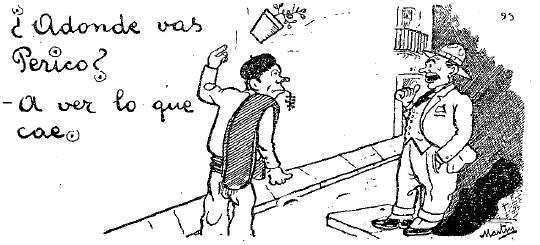
| Языки :: Испанский |
| Аудио |
 |
|
|
281 |
Español |
Spanish |
|
Lección Noventa y cinco (95) |
||
| Tomo las once | I take (something) at 11 | |
| 1 |
Estoy pasando unos días en un puertecito de pesca (1), y con el aire del mar me ha entrado un apetito bárbaro (2). |
I am spending a few days in a little fishing-port and with the air of the sea a monstruous appetite has come to me. |
| 2 |
Por más que me haya desayunado a la hora acostumbrada (3), al regresar de la playa después del baño, a eso de las once u once y media, |
Even when I have breakfasted [for more that I...] at the usual hour, on coming back from the beach after bathing, towards 11 [at that of 11] or half past [eleven]. |
| 3 |
ya tengo ganas otra vez y me voy a tomar un bocadillo en un pequeño café del muelle (4). |
I have already (an) appetite again, and I go to take a mouthful in a little café on [of] the quay. |
| 4 |
Antes, no solía siquiera tomar vermut; pues ahora me tomo dos o tres cañas seguidas de Manzanilla o de Jerez, con otras tantas tapas, |
Before, I did not use to take even an appetizer; well, now, I take two or three glasses running of Manzanilla or Sherry, with as many "tapas". |
| 5 | A lo mejor (5) ¿no saben ustedes lo que son esas tapas? | Perhaps you don't know what "tapas" are? |
| 6 | Pues sencillamente unos platillos con alguna cosita de comer (6) : rajitas de jamón o de salchichón, filetes de anchoa, aceitunas, etc. | Well, simply saucers with a few trifles (good) to eat : small slices of ham or polony, fillets of anchovies, olives, etc. |
| 7 |
Dichas tapas (7) las sirven al consumidor al mismo tiempo que el vino o vermut y sólo cuestan un suplemento de diez céntimos. |
The said tapas they serve to the customer at the same time as the wine or appetizer and they cost only an extra-charge of 10 centimes. |
| 8 | Muchos bañistas, hacen lo que yo (8); algunos prefieren ostras o quisquillas. | Many bathers do like me; some prefer oysters or shrimps; |
| 9 |
Otros se deleitan comiendo percebes, que son unos bichos raros, negros y todo patas lo mismo que arañas monstruosas. |
others enjoy sucking barnacles, which are queer tiny animals, black and all legs, like [the same as] monstruous spiders. |
| 10 | Por lo que a mí se refiere, el tomar las once no me sienta mal (9), ni me quita las ganas de comer. | As [what] regards me, taking (something) at 11 does me no harm [does not suit me ill] and does not blunt my appetite [does not take off the envies of eating]. |
| EJERCICIOS | EXERCISE : | |
| 1 |
¿Adónde vas, Perico? — A ver lo que se cae. |
Where [dost thou go, Pete] do you go? — To see what falls (from the sky). |
| 2 |
Pues entra y siéntate. — Gracias. — ¿Tienes ganas? — Sí, señor, hambre y sed. |
Well come in and sit down. — Thank you. — Have you (an) appetite? — Yes, sir (I am) hungry and thirsty. |
| 3 |
Coge esa tapa y come. Anda, hombre, aprovéchate. Mastica bien y sin apurarte. |
Take this tapa and eat. Go it, man, help yourself. Chew well and don't hurry. |
| 4 |
Ahora bebe un trago. Acaba esas aceitunas. Deja los huesos en el platillo. ¿Todavía hay ganas? |
Now drink a mouthful. —-Finish these olives; leave the stones [bones] in the saucer. — Is there appetite left [still] ? |
| 5 |
Sí, señor. — Pues toma esas ostras : ábrelas, zámpalas y tira los cascos en esa caja... |
Yes, sir. —Well, take these oysters; open them, swallow them up and throw the shells into that box. |
| 6 |
¿Ya están despachadas? — Si señor. — Entonces apura ese vaso y antes de marchar, cántame algo. |
Have you despatched (swallowed) them already? — Yes sir. — Then empty this glass and before leaving, sing me something. |
| 7 | Como guste, señorito, ahí va : | As you like (subj.) [little] gentleman. — Here you are : |
|
A mí me llaman el tonto, el tonto de mi lugar; todos viven trabajando, yo vivo sin trabajar. |
[At] me they call the idiot. — The idiot of my village. — All live (by) working. — I live without working. |
|
|
it will be good for you to practice replacing, in the previous exercise,
tú by usted. Check at the same time the form of verbs : 1 va usted. — 2 entre ... siéntese ... tiene usted. — 3 ... coja ... coma ... ande ... aprovéchese usted ... mastique ... sin apurarse. — 4 ... beba ... acabe ... deje usted. — 5 ... tome ... abra ... zampe ... tire. — -6 ... apure ... cante. Apurar : to empty, exhaust. Apurarse : to hurry. As when we use usted the pronouns object are added to the imperative without any hyphen, but the stress is not shifted : siéntese usted, siéntate : sit down. |
| NOTES. | |
| 1 | Puertecito, dimin. of puerto, port. |
| 2 |
Bárbaro, monstruous, huge, extraordinary; monstruoso, monstruous = misshapen. |
| 3 |
Por más que, literally, for more that, followed by the
subjunctive is the phrase best translating our : (infinit.) as (subject) may. Por más que digas, speak as you may. Por más que yo trabaje, work as I may. |
| 4 |
Tomar un bocadillo, to take a snack, lit. : to take a
mouthful; tomar las once is to take the 11 o'clock snack. Remember that in Spain, people don't take they midday meal until 2 p.m. Tomar vermut (pron. : bermút) is the usual phrase for : to take an appetizer, a "booster", whatever it may be. |
| 5 |
A lo mejor, quite as well, perhaps indeed, no doubt, is a
more expressive variant of : acaso, quizá, tal vez. — Manzanilla and Sherry are much renowned Andalusian white wines. They are usually served in small stemless glasses, narrow and oblong, called cañas, which look like tall Champagne glasses. The word caña in fact means reed. La caña de azúcar, the sugar-cane. |
| 6 |
Platillo is the dimin, of plato, a plate, which we
already know; but this word is used to mean various objects whose shapes resemble more or less that of a plate ; it can be, according to the case, a saucer, a bottle-mat, a scale, and even the cymbals in an orchestra. |
| 7 | Dichas tapas, a phrase much more used in Spanish than in English : the said saucers. |
| 8 | Lo que yo : lo mismo que yo : as well as I. |
| 9 |
The article el may be placed not only before any infinitive : el comer, (the) eating; el dormir, (the) sleeping), etc., but before a complete clause : el tomar vermut antes de comer... the taking (of an) appetizer before eating... — The use of the verb sentar with the meaning of to become or suit is rather slack : los baños me sientan bien, baths suit me well. Esta chaqueta me sienta mal, this coat does not become me. |
|
We will now try to get accustomed to the " tú ". In fact it is very simple. We have come across it already, especially in less. 1, 12, 38, 47, 48 and 92, and you were not much put about, were you? Let us recall that it is characterized normally by the final s; cantas "thou singest" you sing; comes, "thou eatest', you eat; abres, "thou openest", you open, etc... If we want to give an order in the 2nd person singular (tú), we'll only have to do away with that s : canta, sing; come, eat; abre, open. So the ending of the imperative corresponding to tú (= thou = you in the singular more familiar second person, usted being more ceremonious), is a for the verbs in AR and e for those in ER and IR. The following exercise will enable us to get used to these forms. |
